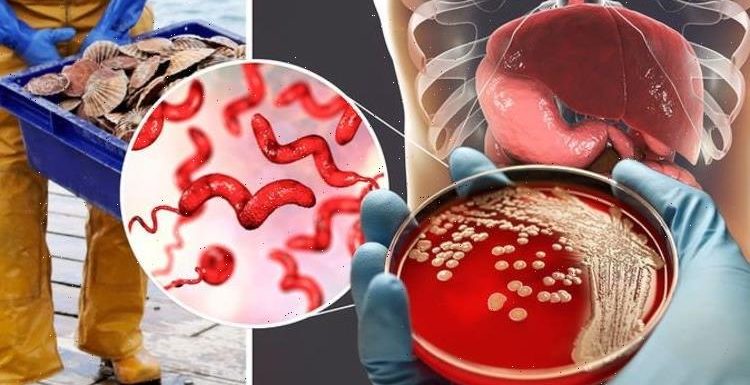
Tiktok user inspects sink bacteria with microscope
We use your sign-up to provide content in ways you’ve consented to and to improve our understanding of you. This may include adverts from us and 3rd parties based on our understanding. You can unsubscribe at any time. More info
Scientists warn that the presence of two vibrio bacteria species discovered in the UK could spell doom for the country’s shellfish industry. These species are able to kill molluscs and can cause damage to human health if the fish is eaten raw or undercooked. The Vibrio rotiferianus and Vibrio jascida are linked with gastroenteritis when a person swallows infected seawater or it comes into contact with wounds or cuts.
While the two Vibrio bacteria species have before been seen in the UK, they have caused mass mortality of shellfish in both France and Australia.
Diseases like these costs the global aquaculture industry £6billion a year, with researchers calling the disease “devastating”.
The researchers used Met Office data to identify locations where summer sea-surface temperatures were favourable for vibrio bacteria –based on the average number of days per year warmer than 18C.
Dr Sariqa Wagley, of the University of Exeter, said: “Vibrio species can often be found in UK waters in summer, when temperatures are more favourable for them.


“With sea-surface temperatures rising due to climate change, Vibrio activity in the waters is more common, and the diversity of Vibrio species is now increasing.”
“We found Vibrio parahaemolyticus – the leading cause of seafood-borne gastroenteritis worldwide – at Chichester Harbour.
“Vibrio alginolyticus, which can also cause illness in humans, was identified at three of the sites that had sea-surface temperatures above 18°C.
These were said to be Chichester Harbour, Osea Island and Whitstable Bay.

Dr Wagley added: “It is important to note that thorough cooking kills harmful Vibrio bacteria in seafood.
“However, increasing abundance and diversity of vibrio bacteria creates health risks not only for people eating seafood, but for those using the sea for recreation purposes – either due to swallowing infected seawater or from the bacteria entering exposed wounds or cuts.
“Vibrio bacteria are also a threat to a variety of marine species including shellfish themselves. Disease costs the global aquaculture industry £6 billion a year, and this burden of disease can be devastating.
“We have not seen mass mortality of shellfish due to vibrio bacteria here in the UK yet, but this has occurred elsewhere – including in France and Australia.”
DON’T MISS:
Scientists discover new approach to beat antibiotic-resistant bacteria [REVEAL]
Archaeologists amazed at ‘totally unbroken’ Roman settlement [INSIGHT]
Boris Johnson facing more disaster as ‘green’ power plant slammed [SPOTLIGHT]


Dr Joanne Preston, from the University of Portsmouth, said: “It is important to monitor the impact of increasing sea surface temperature on potential shellfish pathogens, not just for human health and safety, but also to understand the resilience of our coastal species and habitats to climate change.”
Dr Luke Helmer, from the Blue Marine Foundation and the University of Portsmouth, added: “The impacts of climate change on the marine environment are likely to be widespread.
“Understanding how these changes will affect ecologically and commercially important species and the people that rely on them will be crucial moving forward, in order to mitigate against them.”
The study was published in the journal Water Research.
The Water Services Regulation Authority and the Met Office have been reached for comment.
Source: Read Full Article